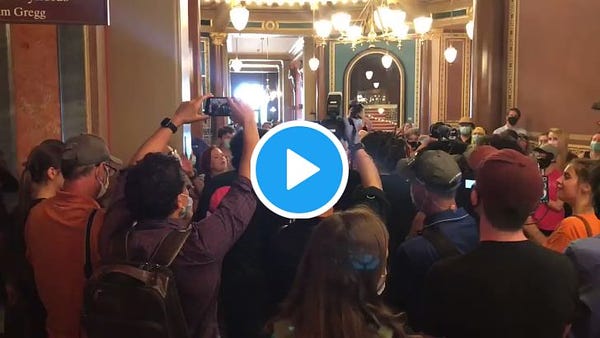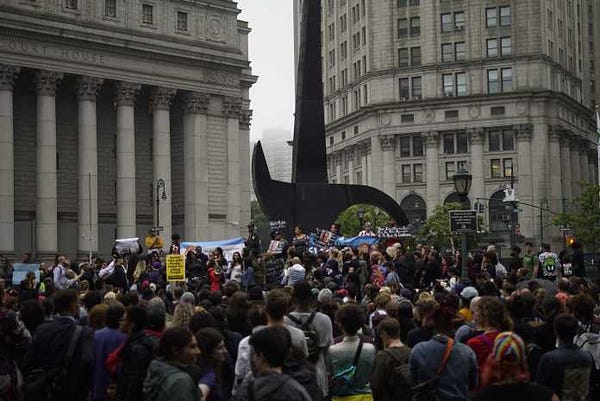Progressives Every Day: Supreme Court rules for LGBTQ civil rights
Also: Defund police, expand Medicaid
Hope everyone had a great weekend — the weather was perfect in NYC and almost everyone I saw outside was wearing a mask.
If you haven’t had the chance yet, check out Spike Lee’s new joint Da 5 Bloods, on Netflix. The man is an underappreciated genius. I’d say that the movie couldn’t be more timely, but all of his movies are actually timeless — we’re just not often paying enough attention.
Keep refreshing throughout the day for more news and updates!
Some progress in Iowa?
Waiting to hear more, but this is promising:

Now, as Daniel Nichanian over at The Appeal points out, the longer it takes to actually restore those rights, the less time people will have to go register to vote. This story in The Appeal describes how COVID-19 has made it far more difficult for activists in Kentucky, where Democratic Gov. Andy Beshear restored the rights of 140,000 ex-felons this winter, to register all the eligible new voters.
Update: Activists were disappointed by their meeting with Reynolds, who did not show up with the goods:
But they emerged from Monday's meeting disappointed that Reynolds had not presented drafted language of what her executive order would look like — something they said she had promised to do on Friday.
"She gave us vague, vague answers like, 'Oh late summer, early fall we'll have something done.' But I don't think she's fully understanding the urgency of the moment that we're in right now," said Jaylen Cavil, a Black Lives Matter activist.
Ex-felon voting rights in Iowa
We’ve been following the twists and turns of Florida’s ex-felon disenfranchisement law over the last few years, from the successful ballot initiative to overturn it to the passage of the Republicans’ Jim Crow law and the ongoing litigation that has followed. But Florida is not the only state dealing racist and draconian laws governing the voting rights of people who have completed their prison sentences. In fact, it’s even worse in Iowa, where the formerly incarcerated cannot get their voting rights restored without express permission from the governor.
Republican Governor Kim Reynolds campaigned on overturning the ban and has for the last few years publicly wrestled with keeping her promise. With the Black Lives Matter movement sweeping the country once again, she has been facing real pressure to actually pull the trigger on some kind of remedy — in 2016, a study found that nearly 1 in 10 African American adults were barred from voting in the state. In total, 60,000 Iowans are barred from voting.
Reynolds is not getting much help from the GOP-controlled legislature, which on Sunday gave up on considering even a weak constitutional amendment that would have required voter affirmation in 2022. Even if that amendment passed, it would have mirrored Florida’s Jim Crow law, necessitating would-be voters pay a load of fines and fees that are often impossible to even ascertain.
The governor now needs to stand up and do the right thing, GOP colleagues be damned. All it’ll take is her signing an executive order that would immediately restore the rights of those 60,000 Iowans. It’s not at all unprecedented — Democratic Gov. Tom Vilsack did it for 115,000 Iowan voters.
On Friday, Reynolds met with Black Lives Matter and other activists, who told the Des Moines Register that she was open to signing the order, but wouldn’t commit to it. They were scheduled to meet again today so that Reynolds could show them a draft of her proposed order and from the tweet below, it seems like they brought friends and supporters.


More SCOTUS news:
This time, it’s about what cases the Court didn’t pick up. The thread that follows the tweet below, which you can access by clicking through, is very instructive and enlightening.


Supreme Court rules in favor of LGBTQ civil rights
This is breaking news —

Remarkably, this was a 6-3 decision, with Roberts and Gorsuch joining the liberal justices. Even more remarkable, Gorsuch wrote the opinion.
This comes just days after the Trump administration announced that it would attempt to legalize healthcare discrimination against trans people; whether or not the Justices knew that was coming down the pike is unclear, but the administration did urge the Court to rule the other way in this case, so either way, it is something of a rebuke.
Neil Gorsuch and John Roberts are no heroes, but it’s good to see that they can muster some humanity from time to time. Also, it’s pretty rich that Brett Kavanaugh would have the guts to rule that anyone should be denied a job, especially for participating in a consensual relationship.

The politics of police reform:
As I noted in yesterday’s big newsletter, a few state and city governments are finally starting to make some modest moves toward reforming their police departments. They are mostly very incremental steps that should have been made years ago, so save the champagne, but at least their leaders are feeling the heat and matching pandering rhetoric with some substantive actions.
Unfortunately, not every state government is reflecting the urgency of the moment. Democrats took over statewide elected offices in Michigan in 2018 and have done a good job with coronavirus (Gov. Gretchen Whitmer has earned high praise for her response) and voting rights (absentee ballot applications for everyone!), but they’ve been much more reticent on criminal justice reform:
In Lansing, Mayor Andy Schor said he would support cutting $100,000 from the local police department — about 0.2 percent of the department’s funding — and was met with jeers and calls to resign from protesters.
Dana Nessel, Michigan’s progressive attorney general, this month took to Twitter and Facebook to say she’s “saddened by the demonization of all police officers and calls to defund law enforcement.” In a typical response, one commenter wrote Nessel “sounds like a privileged, unconscious person.”
And when Gov. Gretchen Whitmer recently told The Root she supports “the spirit” of defunding the police, she quickly clarified the remarks to say, “I don’t believe police should be defunded,” but she supports investment in education, transportation and health care.
Disappointing to say the least, especially given that federal intervention has been required to stop Detroit police officers from killing so many people. Democrats in the state seem to be playing by the old playbook, terrified of being called “soft on crime,” whereas the entire game has changed — just look at the spike in support for Black Lives Matter and correlating fall in support for the police in this new Pew study.

These are national numbers, so they obviously vary across states, but Michigan Democrats are on the upswing, especially after the COVID-19 outbreak, which again, Whitmer has handled admirably. I can only imagine that this is the statistic that keeps Dems there from really speaking out on systemic racism and reform:

Black Lives Matter protests continue:
The media’s attention span is generally not nearly as long as a major story requires (unless it involves a certain former presidential candidate’s emails), so there’s a solid chance that you read little-to-nothing about protests this weekend. That’s a shame because rest assured, they continue to draw tens of thousands of energized and outraged people who are sick of the systemic racism and police brutality in this country.
Here’s a view of LA’s protest on Sunday:
And here’s Sunday’s rally for Black trans lives in Brooklyn, where protests over police brutality and systemic racism fused with protests over the Trump administration’s new and vicious attack on trans people’s civil rights:



If you want to help out in the fight against anti-trans discrimination but can’t make it to a protest, here are two things you can do:
Unfollow JK Rowling on Twitter and refuse to read a Harry Potter or buy another damn Hogwarts house scarf;
Read this comprehensive doc and pitch in where you can.
Medicaid Expansion:
Donald Trump is relaunching his Klan rallies on June 20th in Tulsa (after backing off the explicit Juneteenth hate speech plan). Ten days later, Oklahomans will go to the polls to vote in their party primaries. A ballot initiative to expand Medicaid will also be put to voters that day. As in Missouri, the Governor of Oklahoma placed the question on the primary ballot because these elections generally see a much lower-turnout, which the GOP believes will lower its chances of passing.
Complicating that calculus, however, is the fact that coronavirus cases continue to rise in the state — Oklahoma hit record numbers of new COVID-19 cases over the weekend. And Oklahomans have been teased for years with Republican promises of expanding healthcare, only to see its most frothy right-wing legislators sabotage each and every proposed plan; Gov. Kevin Stitt actually vetoed his own Medicaid expansion bill just this month because he would have had to increase payments to hospitals.
Now, as in Utah and a number of other red states in 2018, voters have a chance to bypass the State House and install the damn thing themselves.
With so much happening in the country, it’s easy to feel overwhelmed by it all and miss the little stories that have an outsized impact on our lives. Progressives Every Day is here to help you keep up, with a daily running blog of key stories, under-reported news, and interviews with activists and candidates.
Subscribing will get you our big Sunday newsletter in your inbox; you can check the home page for daily news updates. If you really like what you’re reading, try a paid subscription, which will get you access to even more posts. Oh, and no matter what, hit that little heart up top, which helps me build the platform!





